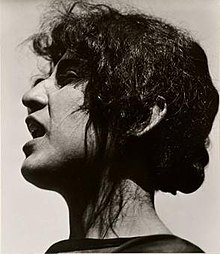Guadalupe Marín
Guadalupe Marín | |
|---|---|
 Portrait of Guadalupe Marín de Rivera by Edward Weston, 1924 | |
| Born | María Guadalupe Marín Preciado October 16, 1895 Ciudad Guzmán, Jalisco, Mexico |
| Died | September 16, 1983 (aged 87) Mexico City, Mexico |
| Nationality | Mexican |
| Other names | Lupe Marín |
| Occupation(s) | Model, novelist |
| Spouses | |
| Children | 3, including Ruth Rivera Marín |

Guadalupe "Lupe" Marín (October 16, 1895 – September 16, 1983), born María Guadalupe Marín Preciado, was a Mexican model and novelist.
Biography
[edit]Marín was born in Ciudad Guzmán, Jalisco, Mexico.[1] When aged eight, Marín moved with her family to Guadalajara.[2] In 1922, she became the second wife of muralist Diego Rivera. She was the mother of Rivera's two youngest daughters, Ruth and Guadalupe Rivera Marín.[3][4] Marín was married to Rivera for six years, ending in 1928.[5]
She was married to the poet Jorge Cuesta on November 9, 1928; they divorced on April 13, 1933.[6][7] She had one son from her second marriage, Lucio Antonio Cuesta-Marín, born in 1930.[7]
Marín was the subject of portrait paintings by Rivera, Frida Kahlo and Juan Soriano.[8][9][10] She is featured in the Rivera mural Creation, for which she modeled as Strength, Song, and Woman,[citation needed] and modeled nude as Earth for Rivera's Chapingo chapel mural while several months pregnant.[citation needed] She also modeled for photographer Edward Weston. Of the 1924 portrait, Weston wrote "I am finishing the portrait of Lupe. It is a heroic head, the best I have done in Mexico."[11]
In 1938, Marín's semi-autobiographical novel La Única (The Unique Woman) was published.[12] Her book La Única was banned in Mexico for many years owing to its erotic nature.[1] In 2003, the novel and Marín were cited by author Salvador A. Oropesa in his book The Contemporáneos Group as being a feminist component of a counterculture writers' movement in post-revolutionary Mexico. She also wrote Un día patrio (A Patriotic Day) in 1941, in which she expressed political ideas.[1]
Legacy and death
[edit]Marín died in Mexico City on September 16, 1983, at the age of 87.
A novel in Spanish about Marín and Rivera's time together, Dos Veces única by Elena Poniatowska, was published in 2016.[6][13]
She was portrayed by Valeria Golino in the 2002 film Frida.[14]
References
[edit]- ^ a b c "Guadalupe Marin, controvertida musa, novelista y primera esposa de Diego Rivera". MXCity (in Mexican Spanish). 2016-08-29. Retrieved 2019-01-23.
- ^ "GUADALUPE MARÍN PRECIADO". Ciudad Guzman. Retrieved September 24, 2020.
- ^ Kettenmann, Andrea (2003). Rivera, p. 24. Taschen GmbH.
- ^ Jinich, Pati (2014). "Diego Rivera's daughter on her father's favorite foods — and Frida Kahlo's parties". The Washington Post. Retrieved 2019-01-23.
- ^ Russell, Ron (2003-12-17). "Secret Rivera". SF Weekly. Archived from the original on 2019-01-24. Retrieved 2019-01-23.
- ^ a b Ahrens, Jan Martínez (2015-10-02). "Lupe, Frida y Diego: los años locos". El País (in Spanish). ISSN 1134-6582. Retrieved 2019-01-23.
- ^ a b "Dos veces Cuesta | Confabulario | Suplemento cultural" (in European Spanish). Retrieved 2019-01-23.
- ^ "Portrait of Lupe Marin, 1938 by Diego Rivera". DiegoRivera.org. Retrieved September 24, 2020.
- ^ "Portrait of Lupe Marin, 1929 - by Frida Kahlo". FridaKahlo.org. Retrieved September 24, 2020.
- ^ "Soriano, Juan (1920-2006) - 1961 Lupe Marin (Private Collection)". Flickr. November 14, 2012. Retrieved September 24, 2020.
- ^ Guadalupe de Rivera, Mexico. 1924, printed later
- ^ Oropesa, Salvador A. (2003). The Contemporáneos Group: Rewriting Mexico in the Thirties and Forties, p. 100. University of Texas Press.
- ^ Hevia, Elena (2016-06-28). "Elena Poniatowska: "Lupe Marín jamás se doblegó a sus maridos"". elperiodico (in Spanish). Retrieved 2019-01-23.
- ^ Wilmington, Michael (2002-11-01). "'Frida'". Chicago Tribune. Retrieved 2019-01-23.
